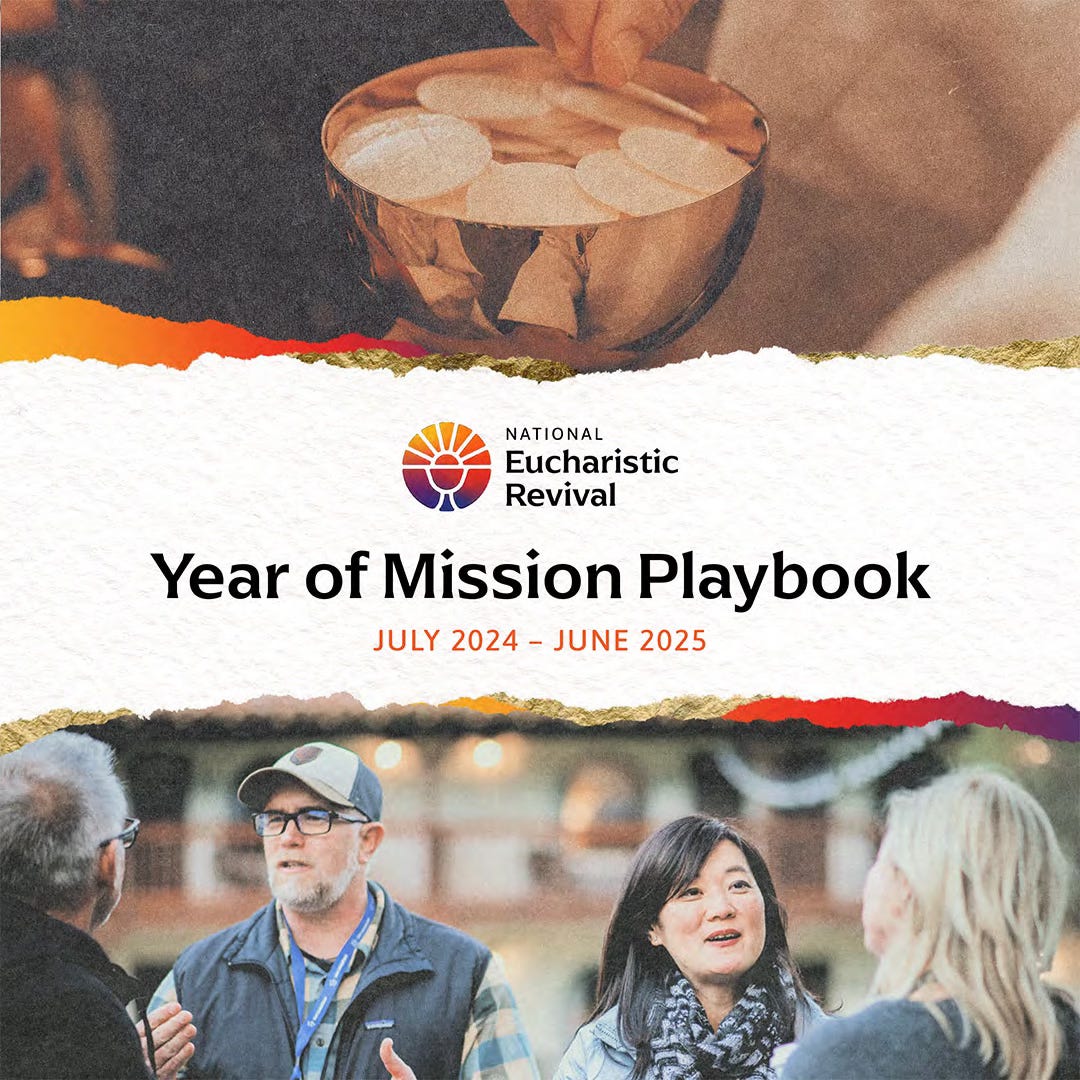The 2024 National Eucharistic Congress video opens with Sr. Josephine Garret's stirring testimony. “The Bridegroom (Jesus) is coming to do something for this land, and I don’t think there’s anyone who could say that our land and our American Church does not need healing.” The shocking scenes that follow illustrate her narration. “This American land is covered in the blood of violence. This American land is covered in the tears of corruption. We need the love of the Eucharistic Jesus in this land.”
The video segues to show Jesus in the Blessed Sacrament processing with pilgrims “from every corner of the United States.” In her final comments, Sr. Josephine stresses that the tens of thousands who attend the Congress have a Mission - to share Jesus’ Good News of Salvation. “So that the healing that is desired in His Sacred Heart may flow forth over this land, that we will not leave any Grace on the table that the Lord has for us, that we will prepare the way well so that the Graces will flow across this land and heal every division.”
The Congress, to be held July 17-21, 2024, at Lucas Oil Stadium, Indianapolis, Indiana, is the American Catholic Church’s First National Eucharistic Congress in 83 years. It will offer a dizzying array of opportunities designed for varied age groups, nationalities, and states of life. The Congress will close with a Great Commissioning ceremony, sending the attendees back“ to our communities across the country with renewed passion for Christ and filled with grace to share.”
Throughout Church history, Our Lord often chose people, noticed by only a few, to champion His unifying peace. Louisiana has a long, multicultural, multi-racial history of animosity. Amid our country’s greatest upheaval, the Civil War, the fearless love of a forgotten French Louisiana Catholic priest may provide Revival missionaries with a new perspective.
According to LSU Professor of Religious Studies and History, Dr. Michael Pasquier, Fr. Isidore Francois Turgis was a single-minded French army chaplain who, despite his frailty, had served in several conflicts. Inspired by the abolition movement, he arrived in New Orleans in 1860, primarily to serve the slaves. Unexpectedly, the Archbishop assigned him to serve as chaplain to the Orleans Guards.
“The Orleans Guard was a regiment comprised of anti-clerical, racist, Catholics of the elite Creole community. Father Turgis was their chaplain, a man with an abolitionist sentiment and an indifference to the Confederate cause.”Nevertheless, Fr. Turgis obediently went where he was called and became an instrument of conversion.
Before Louisiana seceded from the Union, Fr. Turgis had openly “advocated peace, for he loved peace and said that it would be a dreadful thing for brother to raise his hand against brother.” When the horrific bloodshed began, Fr. Turgis was “less interested in an enemy and more interested in the soldiers under his spiritual protection.” He was the “only person (in the Guard)...capable of training his thoughts on God and the dispensation of the sacraments.”
Fr. Turgis died from stomach cancer and fatigue in 1868, only three years after the war ended. Remembered as “the epitome of Christian virtue,” his funeral drew thousands of Louisianans from all walks of life and denominations from as far away as Baton Rouge and Point Coupee Parish. Although he never served enslaved African Americans on the battlefield, he served those suffering from a different kind of enslavement.
Dr. Pasquier concludes that Fr. Turgis “did not kill an enemy, unlike the Christian soldiers of the Confederacy; he did not even see an enemy. Mourners could not stop reiterating his devotion and duty to all soldiers, as well as his courageous disregard for his own life when another life was at stake. Very few soldiers could say the same of themselves, but they could say they knew someone who did.”
The Eucharistic Revival’s final phase, the Year of Mission, is built on four pillars: Eucharistic Encounter, Eucharistic Identity, Eucharistic Life, and Eucharistic Mission. Each pillar has two saints as role models. St. Teresa of Calcutta and St. Francis Cabrini exemplify the Eucharistic Mission.
The Playbook explains, “In imparting the Holy Spirit on us, Christ calls us to go out on mission, evangelizing and tending to those most in need.” Remembering the selfless love Fr. Isidore Turgis showed soldiers on both sides of the Civil War, regardless of their Faith, may be an additional, poignant example to consider.
Learn more about Fr. Isidore Francois Turgis.
American Hero: Fr. Francois Turgis, Chaplain of the New Orleans Guards
Copyright 2024 Connie Anderson.
Images: Tapestry, QH Productions; all rights reserved.
Connie Anderson retired from teaching, television, film-making, and fundraising. A Baton Rouge, LA native, she and her husband, Larry, are the proud parents of two adult children and grandparents of one recently adopted grandson. Connie, a member of St. Robert Southwell’s Writing Group, Word on Fire Institute, is interested in passing on her Faith through stories about Louisiana’s rich Catholic family traditions.









